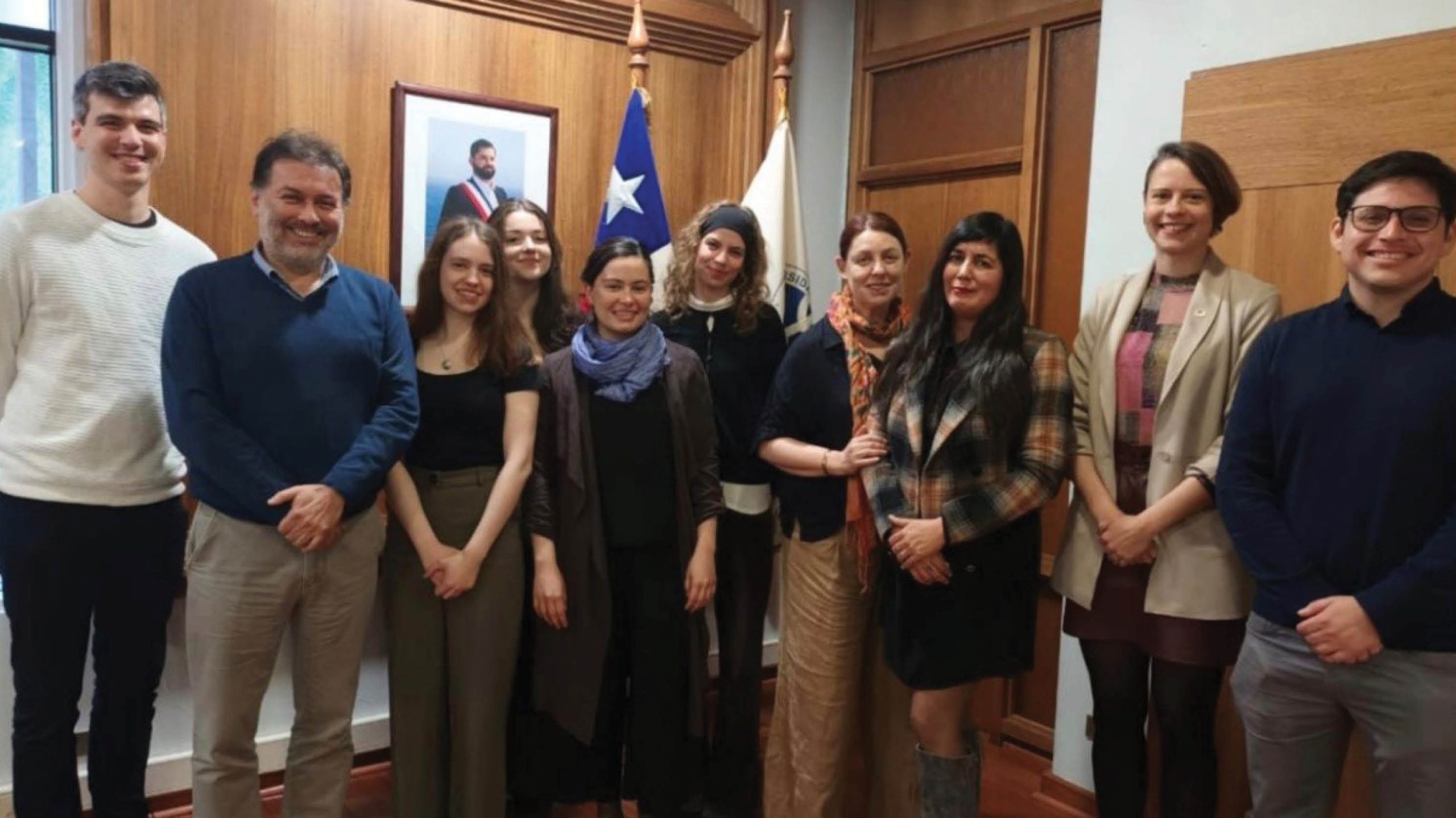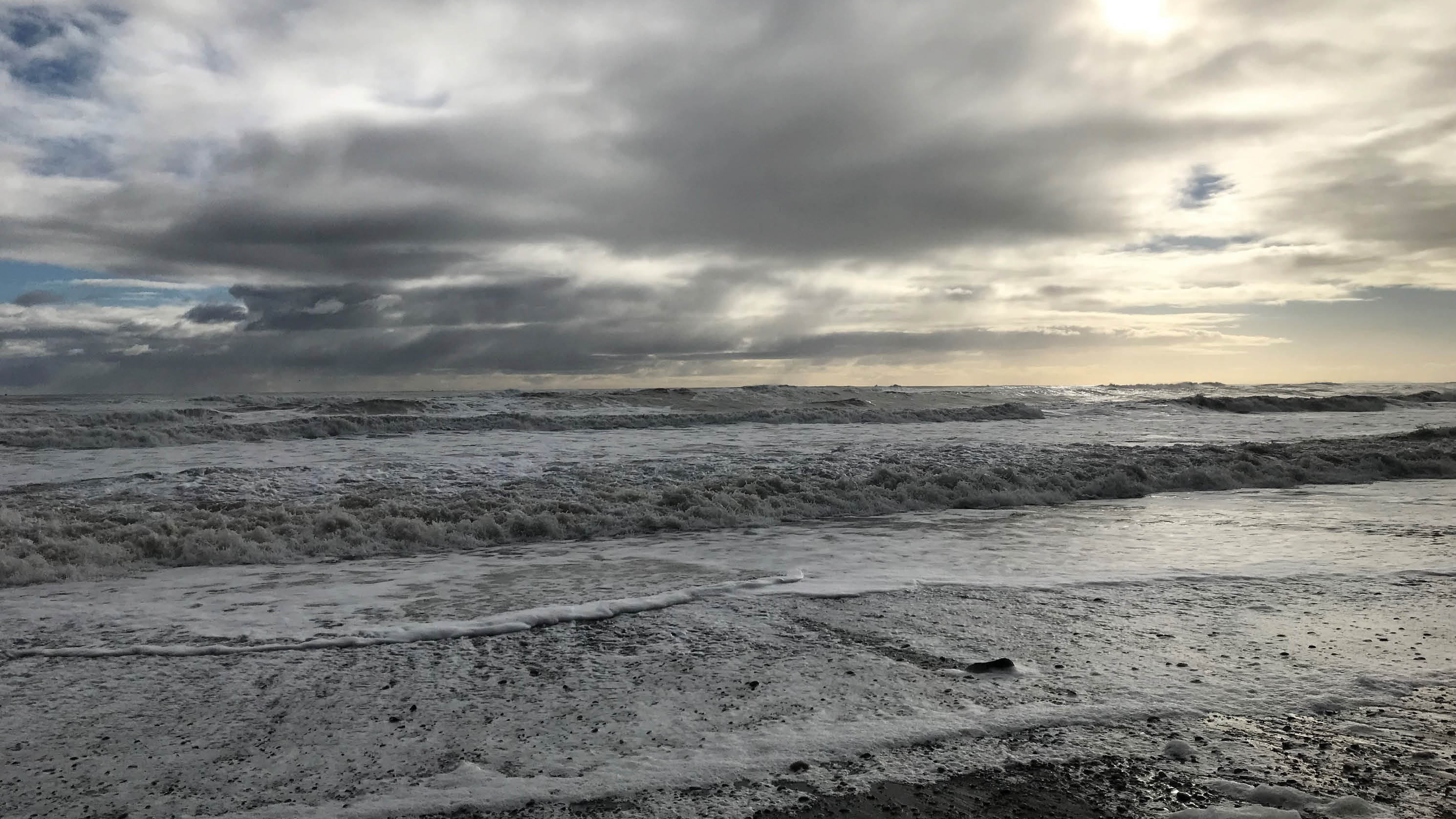Hannah Marincak, a third-year student double-majoring in Spanish and French Languages, Literatures and Cultures, shares about her experience participating in an Undergraduate Research Forum in Chile and Argentina during the Summer 2024 Session. The forum was part of the Palabras Madres translation project, led by Dr. Maria Carbonetti, which aims to increase public access to Indigenous poetry from Chile and Argentina.


The Undergraduate Research Forum team alongside university authorities at the Universidad de La Frontera in Temuco, Chile.
“Palabras Madres is a translation project that aims to make Indigenous literature in Chile and Argentina accessible to a larger public.”
Part 1: Q&A with Hannah Marincak
What was the translation project like?
Palabras Madres is a project led by Dr. Maria Carbonetti that aims to make Indigenous literature (specifically Mapuche poetry in Chile and Argentina) accessible to a larger public, by creating multilingual translations and images or “visual translations” of the poems. We were translating poems from Spanish to English, as well as Spanish to other languages. Some of the poems that we were working with had already been translated from Mapudungun to Spanish, while others were originally written in Spanish or had been written in both Spanish and Mapudungun. I feel so grateful to have had the chance to deepen my comprehension of these works by visiting the land they describe and by hearing some of the authors speak in-person.
The process of translating poems by Indigenous authors from the colonial language of Spanish into colonial languages such as English and French was complicated, but looking at the most effective translation and significance of each word gave me an appreciation for these poems that I couldn’t have achieved by simply reading them. Having the opportunity to create images to accompany our translations was also very helpful, as it allowed us to represent some of the themes of the poem without the use of any one spoken language.


A photo of Puerto Saavedra taken by Hannah.
“Visiting the land that we had read about gave me a much deeper understanding of the poems that we had studied and translated.”
What was the cultural immersion like?
Having the opportunity to visit the land that we had read about gave me a much deeper understanding of the poems that we had studied and translated.
While I was already aware of the importance of Indigenous literature and of the recognition of Mapuche artists, being at Feria del Libro, one of the largest book fairs in Latin America—during the first year that Indigenous authors were included in the event—was very special. In addition, visiting universities in both Chile and Argentina was really interesting and inspiring, and it was nice to chat with students in another part of the world.
I am so incredibly grateful for the kindness and generosity of the many people I had the honour of meeting. Some of the most memorable moments of the trip for me were getting to know the many people who invited us into their homes for a meal. I felt so welcomed by everyone we met, and I am so grateful for the generosity of all of the people who taught us about their work, lives, and the places we were visiting.
What was the biggest highlight?
It’s nearly impossible to pick just one highlight because so many parts of the experience were amazing, but reading our translations (as well as the original) of the poem “Puerto Saavedra” by Cristian Cayupan at Puerto Saavedra was incredible. Seeing the location about which the poem was written made me feel so much more connected to the work and to the many translations that have come out of the Palabras Madres project. Hearing “Puerto Saavedra” read out loud in so many different languages really emphasized the beauty of the poem, as well as the importance of making the Mapuche literature that I have had the honour of studying more accessible to readers who don’t speak Mapudungun or Spanish.


Hannah's 'visual translation' of Tiempo de Luna Fría by Rayen Kvyeh.
“This was one of the most amazing and inspiring experiences of my life.”
Would you recommend this experience to other students?
I would absolutely recommend this unforgettable, once-in-a-lifetime experience to others, as it was so meaningful to meet and work with such incredible authors, artists, professors, and community members. Especially when translating works that are so tied to the land they describe, having a personal understanding of those places is essential. In addition, the linguistic experience of hearing so many fascinating academic discussions in Spanish helped me improve my language abilities. I am so happy and grateful to have had this opportunity, as it will inform my studies and my understanding of translation and literature for years to come.
Part 2: A Deep-Dive into the Project with Dr. Maria Carbonetti
Taking place from April 24 to May 12, 2024, this 18-day non-credit program brought together two graduate students and three undergraduate students who visited Chile and Argentina to connect with local partner universities.
This initiative is part of the larger Palabras Madres project, in which students engaged in translations and cultural exchanges with Mapundungun poets. They presented their translation projects at the International Book Fair in Buenos Aires and other events, engaging with poets and activists in dialogue sessions attended by over 100 participants.
The group was hosted by the Universidad de la Frontera (Centro Interdisciplinario de Investigación y Creación Artística) in Chile and the Universidad Nacional de La Matanza in Argentina, and also collaborated with the Canadian Embassy for Argentina and Paraguay, Inspirad@s (Toronto), and the Republic of Paraguay’s Secretariat of Linguistic Politics.
Highlights:
During the International Book Fair in Buenos Aires and a Canadian Embassy event as part of Strategic Dialogues on Truth and Reconciliation, the group organized a breakfast with over 60 guests from universities and Indigenous artists, writers, leaders, and activists. The project was featured in a panel discussion, and students interacted with some of the poets they had translated in the Spanish 301 and Spanish 402 courses, with their recitations and visual translations also showcased.
Students tailored the experience to their individual research interests, creating podcasts, conducting interviews, and exchanging resources.
Students also curated images representing their connections to the readings and local territories as a “visual translation”, in addition to reciting their translations, which were featured in cultural, academic, and community events.
Looking ahead:
Building on this experience, a third-year project has been developed and will be continued in the Spanish 401 course, with Pamela Zamora as the Graduate Research Assistant. The project will expand to include poets from Guaraní-speaking regions of Paraguay and Argentina, marking a new partnership with Paraguay’s Secretariat of Linguistic Politics.
This phase will feature a bilingual website with a digital exhibition of 12 contemporary Mapuche poets, including biographies, selected poems in their original languages, and English translations. The website will also include a gallery of author photographs, an interactive map of geographic landmarks, and curated historical and contemporary maps of Wallmapu, the Mapuche territory spanning parts of Argentina and Chile. These efforts aim to deepen cross-cultural understanding and engagement with Indigenous languages and literatures.


